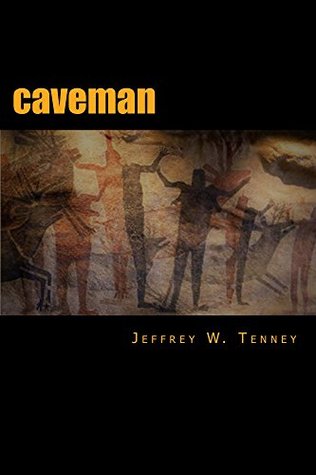
A colleague goads Archaeologist Trent Marshall into visiting a dig site near Solutre, France, telling the superstar professor that evidence there disproves Marshall’s career-making theories on prehistoric civilizations. But it’s a trick, one that sends Marshall through a time-portal cave and back 40,000 years where Neanderthals and Cro-Magnon tribes struggle to survive.
With Marshall is beautiful linguist Bridgette Genet, who goading colleague Sam Jenkins needs to broker a peace that keeps the prehistoric tribes alive. The disbelief of where and when they find themselves quickly turns to survival and then wonder as Trent and Bridgette adjust and finally help Jenkins with his plan to save the prehistoric peoples of the plains of Solutre.
In Caveman, author Jeffrey Tenney has delivered a clever, stripped-to-its-core novel of politics and war among primitive tribes. The strife between the Cro-Magnon Gat tribe and the Neanderthal Musi people allows Tenney to capture the competing, but pure, motivations of power and peace. Jenkins, Bridgette and Trent align themselves with the Neanderthals, and Jenkins, who is mysteriously part Neanderthal, is determined to avert war with diplomacy. Like modern conflicts, there is a lust for power by the Cro-Magnon Tuk, a shaman and the leader of the Gat. But the true driving force behind the conflict is a deeper human need: food. The Cro-Magnon tribe is hungry, and they need the lands of the Neanderthals to survive.
Tenney opens the reader to the brutal and beautiful world of prehistoric man. There’s playfulness, sex and tenderness, along with brutality and a necessary disregard for individual human lives. The success of the tribe demands the sacrifice of an individual to the whole. Tenney plays on this, comparing the complicated, individualistic, modern lives of Trent and Bridgette to the simple lives of humans whose only goal is survival, giving the reader a sense of how primitive people needed an almost perfect sense of alertness and physicality to survive.
Of course, the Gat and Musi attribute things they can’t explain to the supernatural, to the gods. Sacrifices are made, and, in fact, Tuk uses Harkur, the god of the spirit world, to his advantage, keeping his fellow Gat loyal to him by invoking her wishes and powers. The gods demand sacrifices, and Tuk is more than eager to brutally kill his enemies by roasting them alive. In all, it’s a colorful and well-researched narrative that gets to the core of how primitive man lived, which wasn’t always dissimilar to problems we see today.
Caveman is consistently entertaining. The story flows nicely, and the time-lapsed ending surprises and satisfies. A more thorough edit could have cleaned up a few misspellings and grammar issues, but these issues are relatively minor. Overall, it’s an immersive read into a fascinating world that informs as it entertains.
A weak point is Tenney’s exposition on Trent, as he reminisces about modern family life, which attempts to deepen his character but only comes off as portraying him as a stereotypically selfish husband and absent dad. Additionally, Tenney defines Bridgette first as a sexual foil for Trent and, second, as an integral part of the plan to save the Neanderthal and Cro-Magnon. Defining Bridgette more cohesively might have deepened the novel without losing its ability to entertain.
These issues aside, Caveman is a fun and fascinating read overall, illustrating how modern struggles and wars are all part of the continuum of the same desires: safety, peace, and security.
Book Links
STAR RATING
Design
Content
Editing
Get an Editorial Review | Get Amazon Sales & Reviews | Get Edited | Get Beta Readers | Enter the SPR Book Awards | Other Marketing Services























Leave A Comment